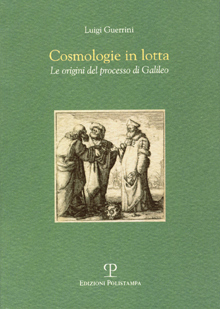Ricerca Veloce
Ricerca Avanzata
chiudi
In the Considerations on the Copernican Opinion that he drafted at some time between 1615 or 16161, Galileo states that the Copernican hypothesis had been allowed by the Church
In the Considerations on the Copernican Opinion that he drafted at some time between 1615 or 16161, Galileo states that the Copernican hypothesis had been allowed by the Church to circulate without hindrance for the last 80 years. This is correct if what is meant is official opposition, but the story is more complex and more interesting as we find out from this scholarly and well-researched book. Luigi Guerrini examines the background to the condemnation of Copernicus’ On the Revolutions of the Heavenly Spheres in 1616 when it was put on the Index of proscribed books. The material is presented in chronological sequence and in three parts. Part one examines the reaction of Giovanni Maria Tolosini to Copernicus, part two considers the Dominicans who opposed Galileo, and the third part offers a reassessment of the events of 1616 when Galileo was forbidden to teach that he Earth moves. According to Guerrini, the oppositions to the heliocentric theory stemmed from a polemical tract that Tolosini, a friar of the Dominican convent of San Marco in Florence, wrote to show that it was at variance with Scripture. The manuscript of this text, De coelo supremo immobili et terra infima stabili ceterisque coelis et elementis intermediis mobilibus, was discovered and published in the original Latin by Eugenio Garin in 1973, and the first two and most important chapters have now been rendered into Italian by Guerrini, and are included as an appendix to his book. Tolosini can hardly be considered an original or profound exegete but he exercised a notable influence on the members of his religious order as well as on educated laymen who used the rich library of the convent of San Marco. The Dominicans were dedicated to the defense and promotion of the theology of Thomas Aquinas and this made them true Domini canes (The Lord’s watchdogs) as their opponents punned on their name. The neighboring church of Santa Maria Novella was also in the hands of the Dominicans it is here that a much-publicized event occurred on the 21 December 1614 when Fr. Tomaso Caccini denounced, from the pulpit of the church, the Copernican system, mathematics and all mathematicians as contrary to the Christian religion and inimical to the state. This was the fourth Sunday of Advent and Caccini probably took as his text a passage from the Act of the Apostles, which, in its Latin version, offers the possibility of the facetious translation: “You men of Galileo (for viri Galilei meaning ‘men of Galilee’) why stand you gazing up into the heavens?” Is this tradition is correct, the selection of that text is the only really clever thing Caccini was ever reported to have done. But he was certainly not being facetious that day, and Galileo was quick to protest. One of his letters went to father Luigi Maraffi, a prominent preacher-general of the Dominican order, who immediately expressed his regret that such stupidity should have been perpetrated by a member of his order. Caccini did not let matters rests but went to Rome where he presented himself “spontaneously” at the Holy Office on 20 March 1615 to denounce Galileo. He was heard by the Commissioner General, Michelangelo Seghizzi, and a Dominican as well. Guerrini points out that Caccini was acting at the request of Cardinal Agostino Galamani, who was a member of the Congregation of the Inquisition, and likewise a Domenican. It would seem that the Cardinal’s friends in the church of Santa Maria Novella, Fr. Raffaello delle Colombe and Fr. Domenico Gori, were apprised of these proceedings. It is interesting to note that the former was the brother of Ludovico delle Colombe, who wrote a tract entitled Against the Motion of the Earth that Galileo postilled. As early as 1613, Fr. Raffaello delle Colombe had delivered and printed a sermon in which he inveighed against the Copernicans but without mentioning Galileo by name. There can be no doubt that there were a significant number of friars, clerics and laymen in Florence who felt strongly that Galileo’s campaign for Copernicus was endangering the authority of the Bible and last, but no least, the authority of the Church that claimed to have the exclusive prerogative of interpreting it correctly.
Data recensione: 01/01/2013
Testata Giornalistica: Archives Internationales d’Histoire del Sciences
Autore: William R. Shea
